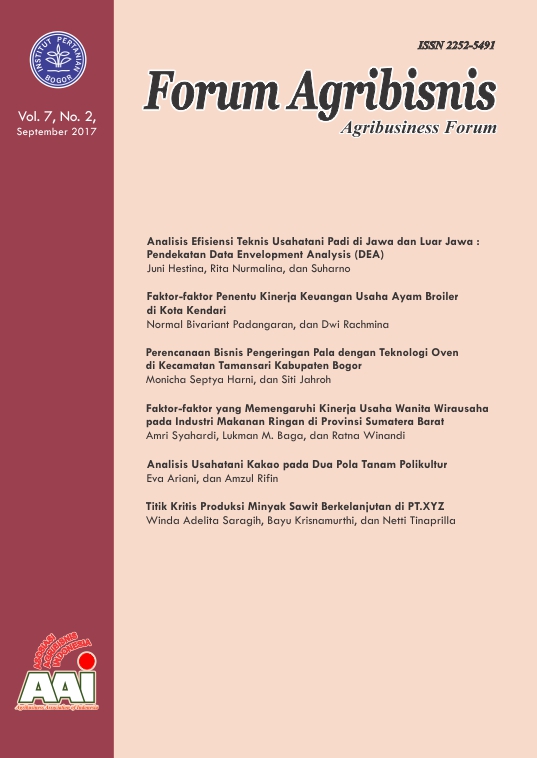ANALISIS USAHATANI KAKAO PADA DUA POLA TANAM POLIKULTUR
Main Article Content
Abstract
The Contributions of cocoa plantations to the profit of farmers is an important issue for the farm development. Cocoa plant is annual plant that can produce throughout the year. In Order to increase profit and Reduce the risk of crop failure, farmers applying polyculture pattern. Application of intercropping patterns on their farm has a linkage with the structure of the costs incurred to cultivate these plants.The purpose of this study is to analyze the level of income and efficiency of the two cropping pattern with the combination of 2 (cocoa and clove) and 3 (cocoa, clove, and coffee) commodities. The method of data collection conducted randomly collected as many as 49 farmers that working on 2 commodities using polyculture cropping pattern and 33 farmers that working on 3 commodities using polyculture cropping pattern. The analytical results showed that the farmers that working on 3 commodities using polyculture cropping pattern have low production level, income, and efficiency, but this polyculture system is still running continuously by the farmers, because it is profitable and has a good efficiency.
Downloads
Download data is not yet available.
Article Details
How to Cite
ArianiE., & RifinA. (2017). ANALISIS USAHATANI KAKAO PADA DUA POLA TANAM POLIKULTUR. Forum Agribisnis : Agribusiness Forum, 7(2), 173-190. https://doi.org/10.29244/fagb.7.2.173-190
Section
Articles
The author submitting the manuscript must understand and agree that the copyright of the article manuscript must be submitted/transferred to the Journal Forum Agribisnis. This work is licensed under the Creative Commons Attribution-ShareAlike 4.0 (CC BY-SA) International License in which the Author and Reader can copy and redistribute the material in any media or format, and remix, modify and build material for any purpose, but they must provide appropriate credit (citing articles or content), provide a link to the license, and indicate whether there is a change. If you mix, change, or create material, you must distribute your contribution under the same license as the original.
References
Aklimawati L. 2013. Potensi Ekonomi Kakao Sebagai Sumber Pendapatan Petani. [Jurnal]. Pusat Penelitian Kopi dan Kakao Indonesia. Vol. 25 No.2.
Bentley WJ. 2004. Neighbor Trees: Shade. Intercropping. And Cacao in Ecuador. [Jurnal]. Plenum Publishing Corporation. Human Ecology. Vol. 32. No. 2. April 2004: Ecuador.
Bonsu K. 2002. Cacao-coconut intercropping in Ghana: agronomic and economic perspectives. [Jurnal]. Cocoa Research Institute of Ghana. Agroforestry Sistems 55: 1–8. 2002: Afrika.
[BPS] Badan Pusat Statistik. Jurnal Statistik Ekspor Impor Komoditas Pertanian 2001-2013. 2013. Jakarta [ID] : Badan Pusat Statistik.
Danial D., Fiana Y., Handayani F., Hidayanto M. 2015. Peningkatan Produksi dan Mutu Kakao Melalui Kegiatan Gernas di Kalimantan Timur [Jurnal]. Pros Sem Masy Biodiv Indon 1 (5) 1203-1210.
David J., Tommy P. 2012. Pengaruh Fermentasi Biji Kakao Terhadap Mutu Produk Olahan Coklat di Kalimantan Barat. [Jurnal]. Kalimantan Barat (ID): Balai Pengkajian Teknologi Pertanian Kalimantan Barat. Biopropal Industry 02 (01).
[Ditjenbun] Direktorat Jenderal Perkebunan. 2016. Statistik Perkebunan Indonesia 2013-2015 : Kakao. Jakarta [ID]: Direktorat Jenderal Perkebunan.
[Ditjenbun] Direktorat Jenderal Perkebunan. 2015. Statistik Perkebunan Indonesia 2013-2015 : Kakao. Jakarta [ID] : Direktorat Jenderal Perkebunan. Kementerian Pertanian.
[Ditjenbun] Direktorat Jenderal Perkebunan. 2012. Pedoman Umum Gerakan Nasional Peningkatan Produksi dan Mutu Kakao Tahun 2012. Jakarta (ID): Direktorat Jenderal Perkebunan. Kementerian Pertanian.
Jumin HB. 2008. Dasar-Dasar Agronomi. Jakarta (ID): PT. Raja Grafindo Persada.
[ICCO] International Cocoa Organization. 2014. International cocoa organization statistics-production [Internet]. [Diunduh pada 2016 Oktober 01]. Tersedia: www.icco.org
[Pusdatin] Pusat Data dan Sistem Informasi. 2016. Outlook Kakao. Kementerian Pertanian: Pusat Data dan Sistem Informasi. ISSN: 1907-1507.
Soekartawi. 2006. Analisis Usahatani. Jakarta (ID): UI Press.
Soekirman. 2007. Sayum Sabah Potret Pertanian Polikultur. Medan (ID): BITRA Indonesia.
Suripatty MP. 2011. Analisis Struktur Biaya Produksi Dan Kontribusi Pendapatan Komoditi Kakao (Theobroma Cacao L) Di Desa Latu. [Jurnal]. ISSN: 1907-7556. Vol. VI Nomor 2 Juni 2011: Agribisnis. Jurnal Agroforestri.
Bentley WJ. 2004. Neighbor Trees: Shade. Intercropping. And Cacao in Ecuador. [Jurnal]. Plenum Publishing Corporation. Human Ecology. Vol. 32. No. 2. April 2004: Ecuador.
Bonsu K. 2002. Cacao-coconut intercropping in Ghana: agronomic and economic perspectives. [Jurnal]. Cocoa Research Institute of Ghana. Agroforestry Sistems 55: 1–8. 2002: Afrika.
[BPS] Badan Pusat Statistik. Jurnal Statistik Ekspor Impor Komoditas Pertanian 2001-2013. 2013. Jakarta [ID] : Badan Pusat Statistik.
Danial D., Fiana Y., Handayani F., Hidayanto M. 2015. Peningkatan Produksi dan Mutu Kakao Melalui Kegiatan Gernas di Kalimantan Timur [Jurnal]. Pros Sem Masy Biodiv Indon 1 (5) 1203-1210.
David J., Tommy P. 2012. Pengaruh Fermentasi Biji Kakao Terhadap Mutu Produk Olahan Coklat di Kalimantan Barat. [Jurnal]. Kalimantan Barat (ID): Balai Pengkajian Teknologi Pertanian Kalimantan Barat. Biopropal Industry 02 (01).
[Ditjenbun] Direktorat Jenderal Perkebunan. 2016. Statistik Perkebunan Indonesia 2013-2015 : Kakao. Jakarta [ID]: Direktorat Jenderal Perkebunan.
[Ditjenbun] Direktorat Jenderal Perkebunan. 2015. Statistik Perkebunan Indonesia 2013-2015 : Kakao. Jakarta [ID] : Direktorat Jenderal Perkebunan. Kementerian Pertanian.
[Ditjenbun] Direktorat Jenderal Perkebunan. 2012. Pedoman Umum Gerakan Nasional Peningkatan Produksi dan Mutu Kakao Tahun 2012. Jakarta (ID): Direktorat Jenderal Perkebunan. Kementerian Pertanian.
Jumin HB. 2008. Dasar-Dasar Agronomi. Jakarta (ID): PT. Raja Grafindo Persada.
[ICCO] International Cocoa Organization. 2014. International cocoa organization statistics-production [Internet]. [Diunduh pada 2016 Oktober 01]. Tersedia: www.icco.org
[Pusdatin] Pusat Data dan Sistem Informasi. 2016. Outlook Kakao. Kementerian Pertanian: Pusat Data dan Sistem Informasi. ISSN: 1907-1507.
Soekartawi. 2006. Analisis Usahatani. Jakarta (ID): UI Press.
Soekirman. 2007. Sayum Sabah Potret Pertanian Polikultur. Medan (ID): BITRA Indonesia.
Suripatty MP. 2011. Analisis Struktur Biaya Produksi Dan Kontribusi Pendapatan Komoditi Kakao (Theobroma Cacao L) Di Desa Latu. [Jurnal]. ISSN: 1907-7556. Vol. VI Nomor 2 Juni 2011: Agribisnis. Jurnal Agroforestri.

